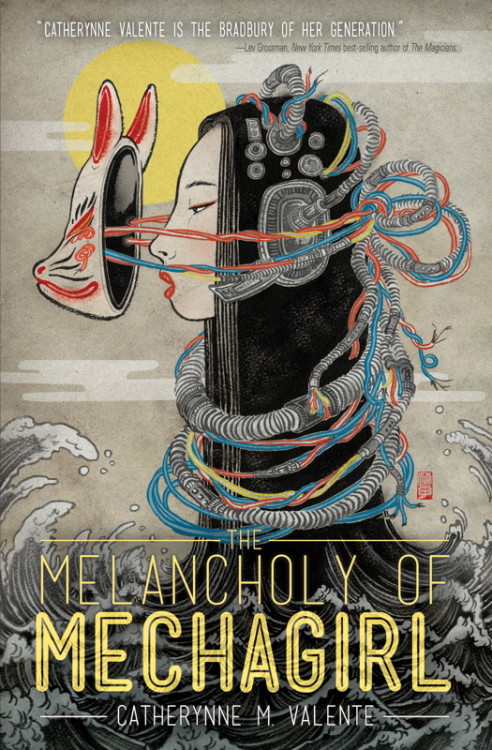
Art by Yuko Shimizu
The Melancholy of Mechagirl features fantasy-inspired short fiction by Valente about Japan, including the Hugo Award-nominated novella Silently and Very Fast and “Thirteen Ways of Looking at Space/Time,’ both of which were originally published in Clarkesworld Magazine. She described ‘The Melancholy of Mechagirl’ as ‘a philosophical confessional poem about anime and giant robots.’ Fans of The Melancholy of Haruhi Suzumiya, a popular anime, will recognize the name. You can read it in Issue 26 of Mythic Delirium. Valente lived in Japan for a number of years, and the people and stories of the country are deeply rooted in much of her fiction. She discussed her relationship with Japanese culture in a 2006 interview with Bookslut:
How did living in Japan affect your writing and your life?
Oh, that’s a big question! I think Yume no Hon is probably one long answer to it, but I’ll give it a shot here.
Japan was very hard for me — my husband, a naval officer, was gone for 19 out of the 25 months we lived there. I was alone in an extremely alien culture, unable to speak the language, without friends or family. I lived alone with my dog and wrote. It was as close to a garret as you can get in the 21st century. I had never experienced loneliness like that before, and I’ll probably be processing it for awhile yet.
However, I came to interact with Japanese culture on my own terms, relatively stripped of the assumptions fostered stateside by anime and other memetic exports. I found my own way to loving it, and though it is a hard-won love, I won’t lose it soon. I lived like a hermit for a year and a half — if you don’t come out of that with some kind of zen, you go crazy.
So instead I wrote. And a lot of what I wrote in that time involves Japanese culture, because that was what I lived with every day. I wrote a novel about a lonely woman slowly losing her mind — not a very subtle allegory, I’ll admit — and another about the Shinto creation myth, and quite a lot of poetry. As a white woman living there, my relationship to Shinto was divided at best — I felt very strongly about it, and traveled all over to visit shrines, yet I always felt like an outsider, which is perhaps appropriate. The gaze of the outsider is part of all of my work, I think.
Part of me will probably always be in Japan, but it will be awhile before I write another Japanese novel. There are always new worlds to devour.
She speaks further about Japan, and particularly the Shinto religion, in an interview with Clarkesworld:
The mythology of Japan will always be with me—the Shinto faith, the syncretic culture, the jungle right up close to the urban sprawl. Some part of me will always be there, always looking for fox-statues in the forest, watching the jellyfish suck at the sides of boats in the harbor. I will never stop being fascinated by it, and processing what it means in relation to me and my work and my internal landscape. It was a hermitage, and I learned all the things good hermits are supposed to learn: how to be alone, how to quiet demons, how to sweep the halls and keep the wolves at the door.
Japanese history and mythology is rife with many stories and themes that resonate through the Fantasy genre. It’s wonderful to see authors like Valente, and collections like this in particular, celebrate a facet of myth and Fantasy that isn’t so beaten to death as the Euro-American stuff, particularly faux-Medieval England. Since learning as a kid that a lot of videogames came from Japan, I’ve been mildly obsessed ever since. This is right up my alley.
And, good golly, that cover art. I said that Joey Hi-Fi should take home an Inky Tentacle for his cover for The Lowest Heaven. He’s not eligible, so, damnit, let’s give the award to The Melancholy of Mechagirl, shall we? Artist Yuko Shimizu certainly deserves some applause for her body of work. Absolutely stunning stuff.
The Melancholy of Mechagirl will be released on July 16th, 2013 by VIZ Media LLC. It is currently available for preorder.

